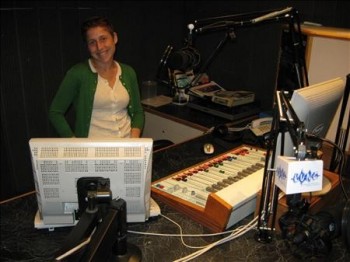Radio Days: Danielle Jacobs '02 Interns at NPR

Danielle Jacobs '02 at KUNC in Colorado
Details
Danielle Jacobs '02 didn't think she wanted to work in radio…but now, if she could do it again, she wouldn't choose anything else.
Jacobs, the recipient of an American Association for the Advancement of Science (AAAS) Mass Media Fellowship, spent the summer interning at National Public Radio (NPR) affiliate KUNC in the town of Greeley, Colo., at the foothills of the Rockies. She admits that at first she was skeptical of the assignment.
“I almost turned down the fellowship because I was offered a summer internship at the American Chemical Society's trade magazine in Washington, D.C.,” she says.“I thought that's what I wanted. I'm not a ski bum. I can't rock climb. And I certainly don't want to live on a farm.” But she describes herself as a person who likes to try new things, and she saw the internship as an opportunity to visit a place she normally wouldn't (Colorado) and try something in which she'd ordinarily have no interest (radio).
And it paid off.
“I saw every part of my finished product from start to finish,” says Jacobs, who recently earned her Ph.D. in organic chemistry from the University of North Carolina in Chapel Hill.“I had to come up with my own stories, research them, go out in the field and interview people, find good ambient noise to add to the piece, write the article, rewrite the article…then voice it, put together all the sound, voices, and narrative, and finally file it for play on the radio either that day or the next.
“It sounds complicated and hard—which it was—but it was tons of fun,” she enthuses.“And, well, I had just gotten my Ph.D.…[it] couldn't have been any harder than that!”
Jacobs started out at KUNC voicing small 50-second pieces called spots, and then moved on to four-to-five-minute features. In searching for stories, she kept in mind advice from the CEO of AAAS on going“glocal:” finding a global theme and applying it to the local population.“My favorite piece was one I did on the ‘psychology of happiness,'” she says.“The World Values Survey had just come out in June and showed that the U.S. was overall 16th in happiness with respect to 97 other nations in the world.” She spoke with the authors of the survey and psychologists at University of Colorado-Boulder who study emotion in a laboratory setting, and also interviewed passersby in the Old Town Square of Ft. Collins, asking them what made them happy. (She was disappointed that people seemed afraid to talk to her.“People fear the microphone,” she says.)
At the end of the piece, Jacobs asked her listeners,“So, should we worry that we are only ranked 16th in the world overall in happiness? I'm not worrying about it,” while the song“Don't Worry, Be Happy” faded into the background.“That's what's so neat about radio—you can make the pieces so dynamic,” she says.
While Jacobs says she would have loved to stay in her“fantasy world” in Colorado, going bouldering and hiking on weekends and waking up to the mountains right outside her bedroom window, she knew she had to get a job…and she knew that job would not be in science journalism. She is now an assistant professor of organic chemistry at Rider University in Lawrenceville, N.J.“I was inspired by all of my professors [at Haverford], especially [Associate Professor of Chemistry] Fran Blase, who was more invigorated and excited by science, teaching, and everything else than anyone I have ever met.”
Jacobs' stint as a science reporter has been unexpectedly beneficial to her teaching career.“Science writing and teaching both have the same goal: to provide the public with an accurate understanding of science that is critical to their personal lives, and to instill in them the drive and desire to learn and investigate more on their own,” she says. By working in a newsroom with people who had no background in science, Jacobs was taught to write for a lay audience; her editors told her what they could and couldn't understand and what didn't interest them at all.
“With that knowledge under my belt, I believe I am better equipped to teach organic chemistry to my students—who are very representative of the lay public,” says Jacobs, who hopes to continue science reporting on the side, encourage her own students to pursue science journalism, and introduce a science communications course into the curriculum.
-Brenna McBride



